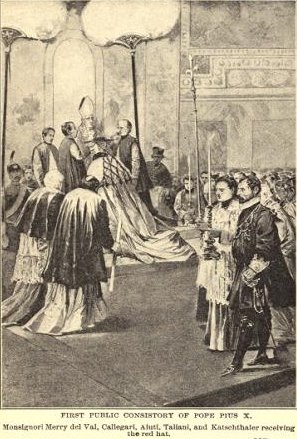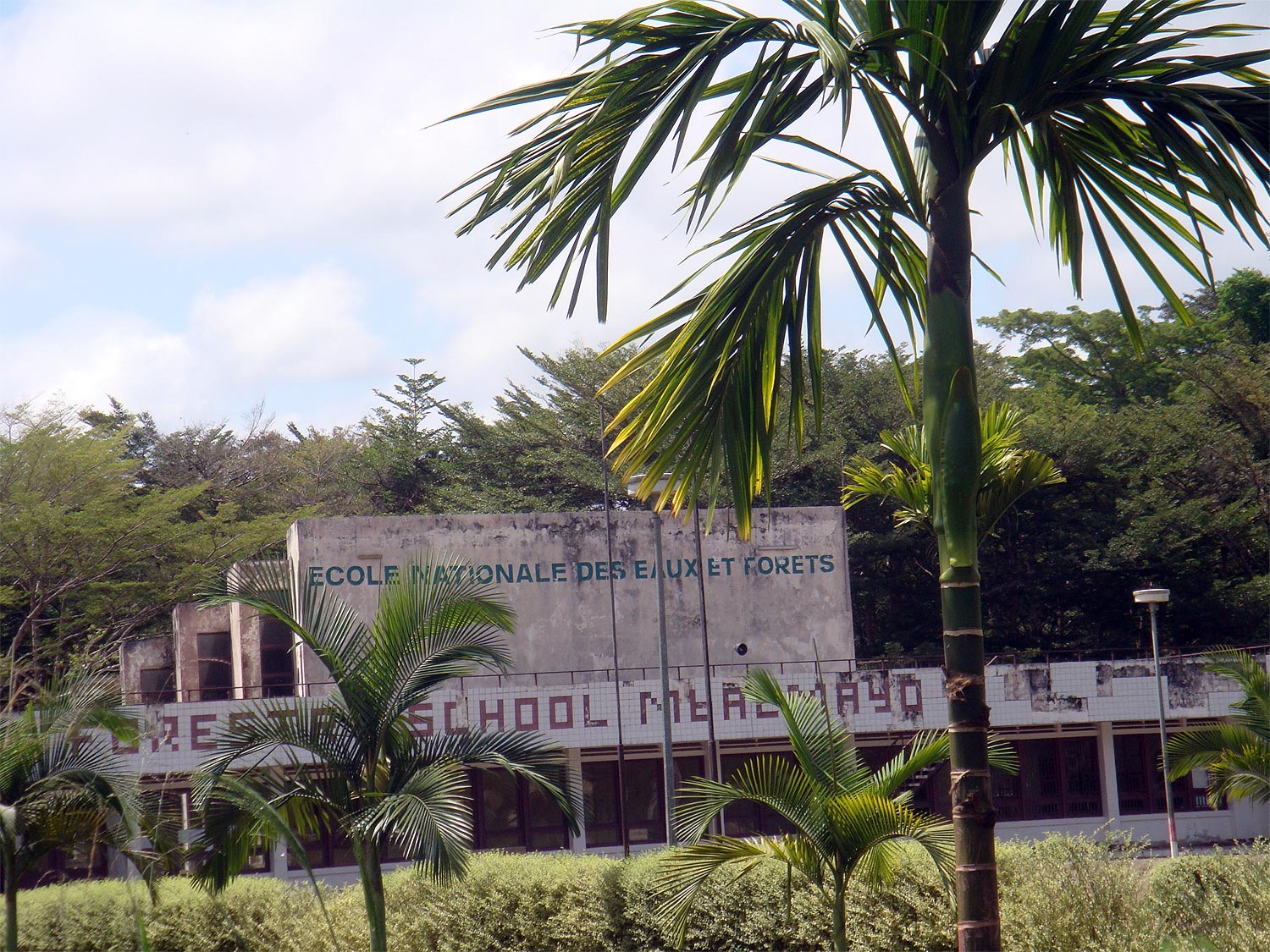|
Dieudonné Nzapalainga
Dieudonné Nzapalainga, CSSp (born 14 March 1967) is a Central African Catholic cardinal, the Archbishop of Bangui and a member of the Congregation of the Holy Spirit. Nzapalainga served as the apostolic administrator of the Archdiocese of Bangui from 2009 until mid-2012 when Pope Benedict XVI appointed him as its metropolitan archbishop; since 2013 he has served as the President of the Central African Episcopal Conference. When Pope Francis made Nzapalainga a cardinal on 19 November 2016 he became the youngest cardinal at the time and the first born after the Second Vatican Council. Life Dieudonné Nzapalainga was born in Bangassou on 14 March 1967. After completing his secondary schooling he commenced his period of formation with the Spiritans and began his time as a postulant at Otéle in Cameroon. Nzapalainga underwent his philosophical studies at Libreville in Gabon and his novitiate with the order in Mbalmayo in Cameroon while later undergoing theological studies in ... [...More Info...] [...Related Items...] OR: [Wikipedia] [Google] [Baidu] |
His Eminence
His Eminence (abbreviation H.Em. or H.E. or HE) is a style (manner of address), style of reference for high nobility, still in use in various religious contexts. Catholicism The style remains in use as the official style or standard form of address in reference to a cardinal (Catholicism), cardinal of the Catholic Church, reflecting his status as a Prince of the Church. A longer, and more formal, title is "His (or Your when addressing the cardinal directly) Most Reverend Eminence". Patriarchs of Eastern Catholic Churches who are also cardinals may be addressed as "His Eminence" or by the style particular to Catholic patriarchs, His Beatitude. When the Grand master (order), Grand Master of the Sovereign Military Order of Malta, the head of state of their sovereign territorial state comprising the island of Malta until 1797, who had already been made a Reichsfürst (i.e., prince of the Holy Roman Empire) in 1607, became (in terms of honorary order of precedence, not in the act ... [...More Info...] [...Related Items...] OR: [Wikipedia] [Google] [Baidu] |
Second Vatican Council
The Second Ecumenical Council of the Vatican, commonly known as the , or , was the 21st Catholic ecumenical councils, ecumenical council of the Roman Catholic Church. The council met in St. Peter's Basilica in Rome for four periods (or sessions), each lasting between 8 and 12 weeks, in the autumn of each of the four years 1962 to 1965. Preparation for the council took three years, from the summer of 1959 to the autumn of 1962. The council was opened on 11 October 1962 by Pope John XXIII, John XXIII (pope during the preparation and the first session), and was closed on 8 December 1965 by Pope Paul VI, Paul VI (pope during the last three sessions, after the death of John XXIII on 3 June 1963). Pope John XXIII called the council because he felt the Church needed “updating” (in Italian: ''aggiornamento''). In order to connect with 20th-century people in an increasingly secularized world, some of the Church's practices needed to be improved, and its teaching needed to be presente ... [...More Info...] [...Related Items...] OR: [Wikipedia] [Google] [Baidu] |
Papal Consistory
In the Roman Catholic Church a consistory is a formal meeting of the College of Cardinals called by the pope. There are two kinds of consistories, extraordinary and ordinary. An "extraordinary" consistory is held to allow the pope to consult with the entire membership of the College of Cardinals. An "ordinary" consistory is ceremonial in nature and attended by cardinals resident in Rome. For example, the pope elevates new cardinals to the College at a consistory; Pope Francis has called consistories for ceremonies of canonization. A meeting of the College of Cardinals to elect a new pope is not a consistory, but a conclave. History The term ''consistory'' comes from the la, con-sistere; "stand together".''Papal Consistory'' by Kevin Knight (Catholic Encyclopedia, 2009) Early popes conferred with their Roman presbytery which included ... [...More Info...] [...Related Items...] OR: [Wikipedia] [Google] [Baidu] |
Episcopal Consecration
A bishop is an ordained clergy member who is entrusted with a position of Episcopal polity, authority and oversight in a religious institution. In Christianity, bishops are normally responsible for the governance of dioceses. The role or office of bishop is called episcopacy. Organizationally, several Christian denominations utilize ecclesiastical structures that call for the position of bishops, while other denominations have dispensed with this office, seeing it as a symbol of power. Bishops have also exercised political authority. Traditionally, bishops claim apostolic succession, a direct historical lineage dating back to the original Twelve Apostles or Saint Paul. The bishops are by doctrine understood as those who possess the full Priest#Christianity, priesthood given by Jesus in Christianity, Jesus Christ, and therefore may ordain other clergy, including other bishops. A person ordained as a deacon, priest (i.e. presbyter), and then bishop is understood to hold the fulln ... [...More Info...] [...Related Items...] OR: [Wikipedia] [Google] [Baidu] |
Paulin Pomodimo
Archbishop Paulin Pomodimo (born 30 June 1954, in Ziendi) is a Roman Catholic archbishop in the Central African Republic. He was the archbishop of the Roman Catholic Archdiocese of Bangui, the capital city of the Central African Republic. He became archbishop in July 2003, when he replaced Joachim N'Dayen. He resigned his post as Archbishop of Bangui on 26 May 2009 after a Vatican investigation found that many local priests had violated their vows of chastity, poverty and obedience. He was later named ombudsman of the Central African Republic by President François Bozizé François Bozizé Yangouvonda (born 14 October 1946) is a Central African politician who was President of the Central African Republic from 2003 to 2013. Bozizé rose to become a high-ranking army officer in the 1970s, under the rule of Jean-B� .... References 1954 births Living people People from Bangui Central African Republic Roman Catholic archbishops 21st-century Roman Catholic archbishops ... [...More Info...] [...Related Items...] OR: [Wikipedia] [Google] [Baidu] |
Marseille
Marseille ( , , ; also spelled in English as Marseilles; oc, Marselha ) is the prefecture of the French department of Bouches-du-Rhône and capital of the Provence-Alpes-Côte d'Azur region. Situated in the camargue region of southern France, it is located on the coast of the Gulf of Lion, part of the Mediterranean Sea, near the mouth of the Rhône river. Its inhabitants are called ''Marseillais''. Marseille is the second most populous city in France, with 870,731 inhabitants in 2019 (Jan. census) over a municipal territory of . Together with its suburbs and exurbs, the Marseille metropolitan area, which extends over , had a population of 1,873,270 at the Jan. 2019 census, the third most populated in France after those of Paris and Lyon. The cities of Marseille, Aix-en-Provence, and 90 suburban municipalities have formed since 2016 the Aix-Marseille-Provence Metropolis, an Indirect election, indirectly elected Métropole, metropolitan authority now in charge of wider metropo ... [...More Info...] [...Related Items...] OR: [Wikipedia] [Google] [Baidu] |
Diaconate
A deacon is a member of the diaconate, an office in Christian churches that is generally associated with service of some kind, but which varies among theological and denominational traditions. Major Christian churches, such as the Catholic Church, the Oriental Orthodox Churches, the Eastern Orthodox Church, the Scandinavian Lutheran Churches, the Methodist Churches, the Anglican Communion, and the Free Church of England, view the diaconate as an order of ministry. Origin and development The word ''deacon'' is derived from the Greek word (), which is a standard ancient Greek word meaning "servant", "waiting-man", "minister", or "messenger". It is generally assumed that the office of deacon originated in the selection of seven men by the apostles, among them Stephen, to assist with the charitable work of the early church as recorded in Acts of the Apostles chapter 6. The title ''deaconess'' ( grc, διακόνισσα, diakónissa, label=none) is not found in the Bible. Ho ... [...More Info...] [...Related Items...] OR: [Wikipedia] [Google] [Baidu] |
Ordained
Ordination is the process by which individuals are consecrated, that is, set apart and elevated from the laity class to the clergy, who are thus then authorized (usually by the denominational hierarchy composed of other clergy) to perform various religious rites and ceremonies. The process and ceremonies of ordination vary by religion and denomination. One who is in preparation for, or who is undergoing the process of ordination is sometimes called an ordinand. The liturgy used at an ordination is sometimes referred to as an ordination. Christianity Roman Catholic, Orthodox, Lutheran and Anglican churches In Roman Catholicism and Orthodoxy, ordination is one of the seven sacraments, variously called holy orders or '' cheirotonia'' ("Laying on of Hands"). Apostolic succession is considered an essential and necessary concept for ordination in the Catholic, Orthodox, High Church Lutheran, Moravian, and Anglican traditions, with the belief that all ordained clergy are ... [...More Info...] [...Related Items...] OR: [Wikipedia] [Google] [Baidu] |
France
France (), officially the French Republic ( ), is a country primarily located in Western Europe. It also comprises of Overseas France, overseas regions and territories in the Americas and the Atlantic Ocean, Atlantic, Pacific Ocean, Pacific and Indian Oceans. Its Metropolitan France, metropolitan area extends from the Rhine to the Atlantic Ocean and from the Mediterranean Sea to the English Channel and the North Sea; overseas territories include French Guiana in South America, Saint Pierre and Miquelon in the North Atlantic, the French West Indies, and many islands in Oceania and the Indian Ocean. Due to its several coastal territories, France has the largest exclusive economic zone in the world. France borders Belgium, Luxembourg, Germany, Switzerland, Monaco, Italy, Andorra, and Spain in continental Europe, as well as the Kingdom of the Netherlands, Netherlands, Suriname, and Brazil in the Americas via its overseas territories in French Guiana and Saint Martin (island), ... [...More Info...] [...Related Items...] OR: [Wikipedia] [Google] [Baidu] |
Mbalmayo
Mbalmayo is a town in Cameroon's Centre Region. The town had 60,091 inhabitants in 2012. It is the capital of the Nyong-et-So'o Division It is located at the banks of the Nyong river between Ebolowa and Yaoundé. It is an agricultural centre and has an important function as a centre of education. It has several primary and secondary schools owned by the government, Roman Catholic Church, Religious bodies and lay Private individuals. It is a beautiful town with many tourist attractions, once in town you can visit the Roman Catholic cathedral built during the colonial era, the water catchment at Akomnyada, the Marianne Sanctuary at Nkolbindi, two wood transformation factories Exam placage and COCAM, an old German bridge across the Nyong river constructed by Germans in the early 1900s and so on. The hotel and lodging sector is fast growing with many modern hotels and lodging structures springing up like mushrooms. Site of the Mbalmayo National Forestry School. History Mbalm ... [...More Info...] [...Related Items...] OR: [Wikipedia] [Google] [Baidu] |
Novitiate
The novitiate, also called the noviciate, is the period of training and preparation that a Christian ''novice'' (or ''prospective'') monastic, apostolic, or member of a religious order undergoes prior to taking vows in order to discern whether they are called to vowed religious life. It often includes times of intense study, prayer, living in community, studying the vowed life, deepening one's relationship with God, and deepening one's self-awareness. The canonical time of the novitiate is one year; in case of additional length, it must not be extended over two years.CIC, canon 648 In the Eastern Orthodox Church, the novitiate is officially set at three years before one may be tonsured a monk or nun, though this requirement may be waived. The novitiate is in any case a time both for the novice to get to know the community and the community to get to know the novice. The novice should aspire to deepening their relationship to God and discovering the community's charism. The novit ... [...More Info...] [...Related Items...] OR: [Wikipedia] [Google] [Baidu] |






